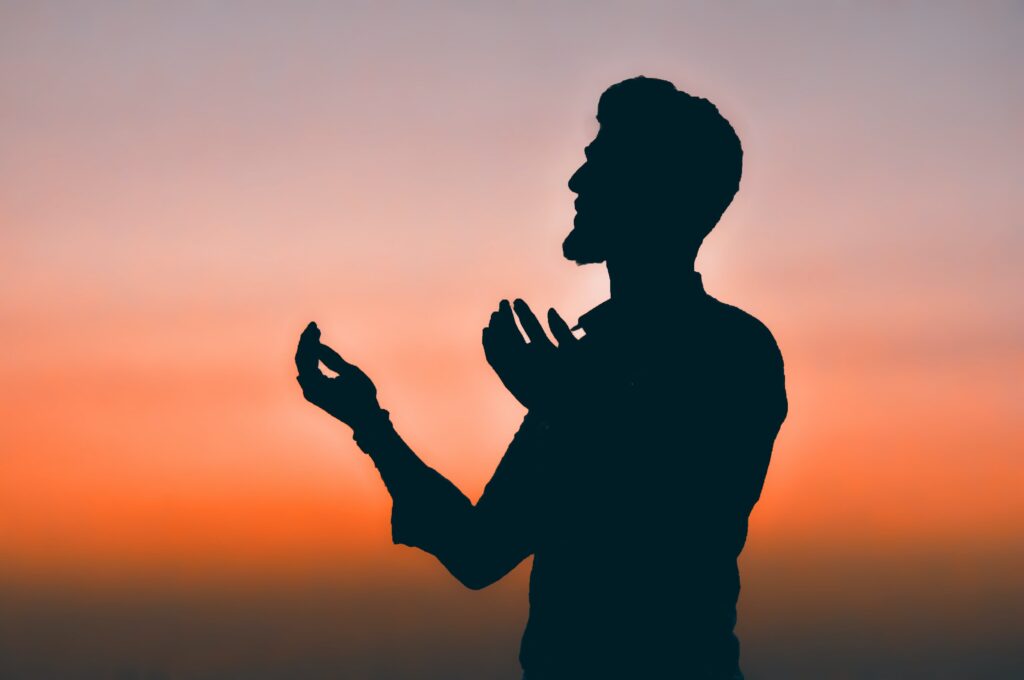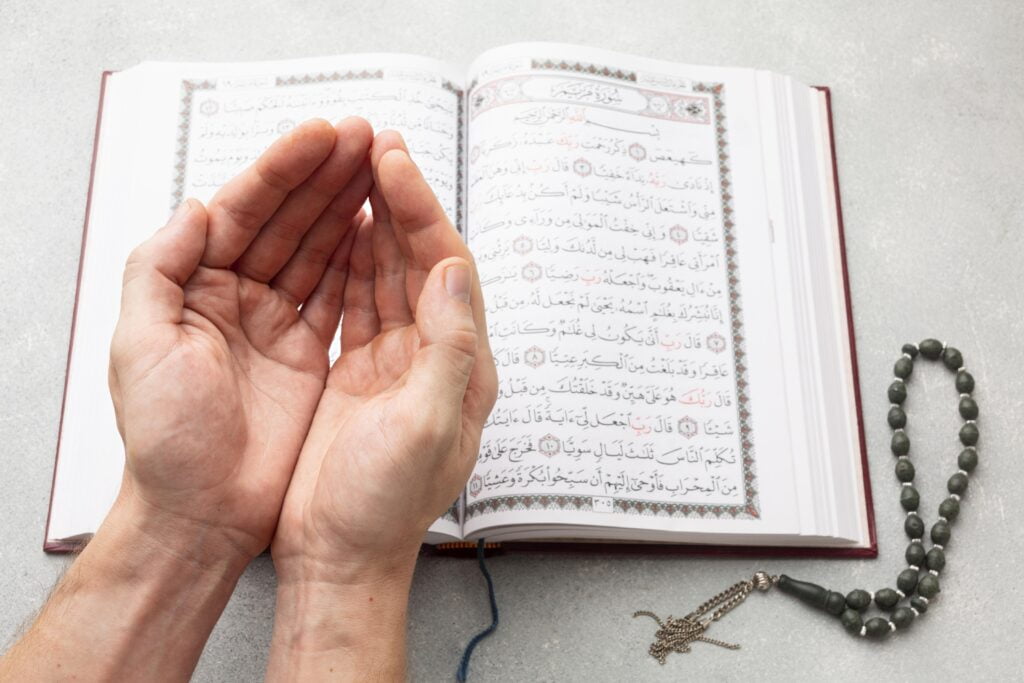I. Introduction
In the rich tapestry of Islamic practice, Dua, or supplication, stands as a profound and essential thread. Let’s embark on a journey to explore the depth of this spiritual act, understanding its definition, significance in Islam, what are Etiquettes/Adab of Dua and the intricate connection between etiquette and its effectiveness.
A. Definition of Dua:
Dua, at its core, is a heartfelt plea and communication with the Divine. It transcends a mere prayer; it’s an intimate conversation where believers express their deepest desires, fears, and gratitude to Allah. It’s a channel to seek guidance, mercy, and blessings.
B. Importance of Dua in Islam
The significance of Dua in Islam cannot be overstated. It’s a powerful tool gifted to believers, emphasizing the direct connection between the Creator and His creation. Dua is a means to acknowledge our dependency on Allah, fostering humility and gratitude in our hearts.
In the narrations above, Anas (may Allah be pleased with him) reported that the Prophet Muhammad (peace be upon him) said, “Dua (supplication) is the essence of worship.”
We can understand this narration by comparing it to a nut. The outer shell and husk have no value, and they are discarded, revealing the inner kernel. Similarly, in supplication, the essence is crucial, much like extracting the core from a nut and utilizing it, whether it be an almond or a similar item.
Likewise, in all acts of worship, supplication holds paramount importance. This is because the fundamental purpose of worship before the Almighty Allah is to express one’s helplessness and humility. The true essence of this helplessness and humility is manifested in supplication, where a person places their issues before their Lord with utmost helplessness, expressing their vulnerability and weakness. With deep humility, they present their pleas, making supplication the true essence of worship.
Another narration by Abdullah bin Umar (may Allah be pleased with him) emphasizes that the door of mercy opens for the one whose door of supplication opens. The Prophet (peace be upon him) stated that among all the things asked from Allah, seeking well-being and health is the most beloved.
Hence, it is crucial for every believing man and woman to develop a taste for supplication. This inclination should be instilled in our children, teaching them to turn to Allah alone, seeking hope and refuge only in Him.
C. Connection between Etiquette and Effectiveness:
The efficacy of Dua is intricately linked to the manner in which it is performed. Understanding the etiquettes of Dua enhances its effectiveness. The etiquette involves choosing the right words, maintaining sincerity, and following the established traditions laid out by Prophet Muhammad (peace be upon him).
When we approach Dua with the proper etiquette, it becomes a transformative experience. The connection established is not merely transactional but transformative, impacting our spiritual journey profoundly.
As we delve deeper into the layers of Dua, we unravel the secrets of its efficacy and the beauty lying in observing its etiquettes. Join us on this exploration of faith, where words meet the divine and hearts find solace in the act of supplication.
How to pray properly?

Physical Etiquette During Dua:
Engaging in Dua, or supplication, involves not only the words uttered but also the physical aspects of the act. Observing proper physical etiquette during Dua enhances the sincerity and effectiveness of this spiritual practice. Let’s delve into the key considerations for maintaining a respectful and focused demeanor when communicating with the Divine.
Rituals and Gestures:
Embrace the Sunnah by adopting specific gestures during Dua. Raising your hands in humility and submission is a well-established practice, symbolizing your openness to receiving blessings and mercy.
Posture and Body Language:
Your physical posture matters during Dua. Choose a humble and reverent stance, such as kneeling or prostrating, to convey the depth of your supplication. Aligning your body with the humility of your words adds sincerity to your prayer.
Symbolism in Physical Actions:
Every physical action in Dua carries symbolic weight. Bowing your head signifies submission, while closing your eyes fosters inner reflection. Understanding the symbolism enhances the spiritual impact of your supplication.
By paying attention to the physical aspects of Dua, you not only adhere to the Sunnah but also create a profound connection between your body and soul in the sacred act of supplication.
Dua Etiquette: Insights from the Quran

In the profound verses of the Quran, we find invaluable guidance on the etiquettes of Dua, or supplication. Let’s delve into the sacred text to unravel the wisdom and etiquettes prescribed for believers when communicating with their Creator.
Clarity and Sincerity:
The Quran encourages believers to make their supplications with clarity and sincerity. Allah, in His infinite wisdom, states, “And when My servants ask you concerning Me, indeed I am near. I respond to the invocation of the supplicant when he calls upon Me.” (Quran 2:186) This verse emphasizes the closeness of Allah and the importance of clear, sincere communication in Dua.
Perseverance and Patience:
Allah reminds believers to be patient and persistent in their supplications. “And seek help through patience and prayer, and indeed, it is difficult except for the humbly submissive [to Allah].” (Quran 2:45) This highlights the significance of perseverance in Dua, coupled with patience, as believers navigate the challenges of life.
Humility and Submission:
The Quran emphasizes the essence of humility and submission during supplication. “And your god is one God. There is no deity [worthy of worship] except Him, the Most Gracious, the Most Merciful.” (Quran 2:163) This verse underscores the importance of acknowledging Allah’s greatness with humility, recognizing His mercy and compassion.
Gratitude in Dua:
Gratitude is a key component of Dua etiquette, as highlighted in the Quran. “And [remember] when your Lord proclaimed: ‘If you give thanks [by accepting faith], I will surely give you more; but if you are ungrateful, verily My punishment is severe.'” (Quran 14:7) Expressing gratitude in supplication opens the doors to increased blessings from Allah.
Seeking Forgiveness:
The Quran guides believers to seek forgiveness in their supplications. “And those who, when they commit an immorality or wrong themselves [by transgression], remember Allah and seek forgiveness for their sins.” (Quran 3:135) This emphasizes the importance of acknowledging one’s shortcomings and seeking Allah’s forgiveness with a repentant heart.
In essence, the Quran provides profound insights into the etiquettes of Dua, guiding believers on the path of sincere, humble, and patient supplication. These timeless principles serve as a beacon of wisdom for those seeking a closer connection with their Creator through the act of Dua.
Dua Etiquettes: Insights from Hadiths:
Narrated by Abu Huraira (may Allah be pleased with him): The Prophet Muhammad (peace be upon him) said, “When any one of you prays, let him not say, ‘O Allah, forgive me if You wish, or grant me mercy if You wish,’ but he should be firm in his request and be determined. He should ask with strength and sincerity, for indeed, granting anything to Allah is not difficult.” (Narrated by Muslim)
This narration, as reported by Abu Huraira, teaches us the essence of supplication etiquette. It emphasizes that when seeking from Allah, one should not express uncertainty by saying, “If You wish.” Instead, the supplicant is encouraged to be firm, resolute, and determined, expressing complete trust that Allah can grant their request. The act of supplication is not about the difficulty for Allah but about the sincerity, humility, and determination of the seeker.
Another narration, reported by Sulaiman (may Allah be pleased with him), illustrates the modesty of Allah in response to His servant’s supplication. The Prophet Muhammad (peace be upon him) stated, “Indeed, your Lord is shy and generous. He is shy when a servant raises his hands to Him (in supplication) to return them empty, disappointed.” (Mishkat al-Masabih, p. 195, Tirmidhi)
This beautiful narration portrays Allah’s humility and generosity. It highlights that when a servant raises their hands in supplication, Allah, out of His generosity, does not return them empty-handed. It emphasizes the importance of turning to Allah with complete trust, knowing that He responds to the sincere calls of His servants.
Furthermore, the narration of Umar (may Allah be pleased with him) provides insight into the Prophet’s physical etiquette during supplication. Umar reported, “When the Prophet (peace be upon him) raised his hands in supplication, he would not lower them until he wiped his face with them.” This signifies the humility and respect shown by the Prophet during the conclusion of his supplication, as he gently wiped his face with his hands.
In essence, these hadiths underscore the importance of a sincere and determined approach in supplication. Believers are encouraged to express unwavering trust in Allah’s ability to fulfill their requests. Moreover, the humility and modesty demonstrated by the Prophet in his physical gestures serve as a guide for believers to adopt a respectful posture during and after their supplications.
31 Sunnah Etiquettes/Adab of Dua: Insights from Allama Jazri (R.a)

In his book “Al-Hisn Al-Hasin,” Allama Jazri (may Allah have mercy on him) compiled various etiquettes derived from different hadiths. Let’s explore these etiquettes in detail:
- Being in a State of Ritual Purity (Wudu):Ensure you are in a state of ritual purity before initiating dua.
- Commencing with Praise and Gratitude to Allah:Begin by praising and thanking Allah, invoking His beautiful names and perfect attributes.
- Reciting Blessings upon the Prophet (Durood Sharif):Follow with sending blessings upon the Prophet Muhammad (peace be upon him).
- Facing the Qiblah (Kaaba):Orient yourself towards the Qiblah, the direction of the Kaaba in Mecca.
- Directing the Heart Sincerely towards Allah:Approach Allah with a sincere heart, acknowledging that only Allah can accept dua.
- Ensuring Physical Cleanliness (Taharah):Maintain cleanliness and purity.
- Repeating Wudu if Necessary:Renew your ablution if needed.
- Performing a Good Deed Before Dua:Engage in a virtuous act before making dua, such as performing a voluntary prayer.
- Sitting for Dua with Humility:Sit humbly for dua, preferably in a state of ablution.
- Raising Both Hands in Supplication:Lift both hands while making dua, with open palms.
- Praying with Khushoo and Khudoo (Sincerity and Devotion):Pray with deep devotion and sincerity, involving your entire body in supplication.
- Expressing Helplessness and Humility:Display helplessness and humility during dua.
- Reflecting One’s Condition and State: Express your condition and state during supplication, including your voice and posture.
- Avoiding Raising Eyes Towards the Sky: Refrain from lifting your gaze towards the sky.
- Avoiding Musical and Poetic Styles: Abstain from using musical or poetic styles and be mindful of the tone of your voice.
- Seeking Intercession through Prophets and Saints: Seek intercession through the prophets and righteous saints.
- Acknowledging Sins and Seeking Forgiveness: Acknowledge sins and seek forgiveness.
- Combining Eagerness, Hope, and Confidence: Combine eagerness, hope, and confidence, believing that your dua will be accepted.
- Presenting an Open Heart to Allah: Open your heart to Allah during supplication.
- Repeating Requests for Essential Needs: Repeat requests for essential needs at least three times.
Insistent Supplication with Persistence: Pray insistently, with determination and persistence, earnestly seeking from Allah. - Avoiding Impossible Requests: Refrain from making requests that are logically impossible.
- Prioritizing Selfless Prayer: When praying for others, begin by supplicating for yourself, then extend your prayers to others.
- Choosing Concise Words with Profound Meaning: Opt for concise words that carry profound meanings, asking for a multitude of worldly and hereafter needs in just a few words.
- Drawing from Quranic and Hadith Duas: Utilize supplications found in the Quran and Hadith, as they contain comprehensive and blessed words.
- Seeking All Needs from Allah: Ask Allah for every need, whether it’s salt for your food or a replacement strap for a broken shoe.
- Including Followers in Imam’s Prayer: If you are leading the prayer (imam), don’t only pray for yourself but include those following you in your supplications (using plural words).
- Concluding with Praise for Allah: Before concluding your supplication, express gratitude and praise for Allah.
- Sending Blessings upon Prophet Muhammad (peace be upon him): Send blessings upon the Prophet Muhammad (peace be upon him) at the end of your supplication.
- Saying ‘Ameen’ at the End: Conclude your supplication by saying ‘Ameen.’
- Finally, Place Your Hand on Your Face: Complete the supplication process by placing your hands over your face. This comprehensive guide covers 31 etiquettes of dua, providing a detailed roadmap for a meaningful and effective supplication.
Meaning of Acceptance of Prayer:
Abu Saeed Al-Khudri (may Allah be pleased with him) reported that the Prophet Muhammad (peace be upon him) said: “There is no Muslim who supplicates to Allah with a supplication that does not involve sin or cutting family ties, but that Allah will grant him one of three things: Either He will speedily fulfill his supplication, or He will store it for him in the Hereafter, or He will turn away from him an equivalent amount of evil.” They (the Companions) said, “We will then supplicate plenty.” He replied, “Allah’s bounty is more.” (Mishkat Ul Masabih.Ahmad)
This Hadith underscores the universal acceptance of prayers by Allah for all Muslims, provided the supplications are free from sinful requests and harmful intentions. It stresses the importance of nurturing familial bonds and kindness, denouncing actions that lead to cutting family ties, known as “Qata Rahmi.” The Prophet Muhammad (peace be upon him) warns against this grave sin, declaring that those who sever family ties will be barred from Paradise.
While Qata Rahmi is a severe transgression, the Hadith emphasizes Allah’s boundless mercy and the potential acceptance of prayers, as long as they steer clear of sinful or harmful appeals. Acceptance of prayer doesn’t always mean immediate fulfillment but may manifest in various forms, including blessings in this world, reserved rewards in the Hereafter, or the prevention of equivalent harm.
Moreover, the narration highlights the unseen effects of prayers, with some outcomes becoming apparent only in the Hereafter. Believers are encouraged to recognize the profound value of prayers and maintain hope, even if immediate results are not visibly evident. Allah’s wisdom governs the responses to prayers, encompassing both worldly and eternal benefits.
: 31 Sunnah Etiquettes/Adab of Dua We Can’t Ignore: Dua 100% accepted Because Allah Loves usRead more to know the best Quranic Duas to Recite in Salah :
FAQ’s:
?What Do You Say At The End Of The Dua
Say “Ameen” after completing your supplication. It signifies your affirmation and agreement with the prayer you’ve just made.
?What do you say before reciting dua
- Begin by praising and glorifying Allah (Subhanallah).
- Invoke blessings upon the Prophet Muhammad (peace be upon him) (Salawat).
- Choose words that reflect humility and devotion.
?What is the hand position for dua
- Cup your hands together.
- Raise them to chest level or slightly above.
- Keep palms facing upward in a gesture of supplication.
?Can I pray with my eyes open
- Closing the eyes is recommended for deeper concentration.
- However, praying with eyes open is permissible, especially if it helps maintain focus.
When should I make dua?
You can make dua at any time, but certain moments, such as during prayer, are considered more auspicious.
What should be the state of my heart during dua?
Ensure sincerity and humility in your heart, believing that Allah is capable of answering your prayers.
Is there a specific direction to face while making dua?
While facing the Qibla (Mecca) is recommended, you can make dua in any direction.
Can I make dua in my own language?
Yes, you can make dua in any language, as Allah understands all languages.
How long should my dua be?
Dua can be brief or lengthy; the sincerity of your supplication is more crucial than its length.
Should I repeat my dua for it to be accepted?
While repetition is allowed, focus more on the quality of your dua than the quantity.
Can I make dua for others?
Yes, it’s encouraged to pray for others’ well-being, and Allah may reward you for your compassion.
Is there a specific posture for making dua?
You can make dua in any position, but certain postures, like prostration, are considered more favorable.
Can I make dua for material possessions?
Yes, you can pray for your needs, but balance your requests with gratitude and spiritual aspirations.
How do I handle unanswered dua?
Trust that Allah knows what is best and may answer your dua in different ways, including delaying or substituting it with something better.
The Prophet (peace be upon him) said: “The best among you (Muslims) are those who learn the Quran and teach it.” (Sahih Bukhari)….
Ignite a chain of knowledge! Learn and share….






Your article helped me a lot, is there any more related content? Thanks!
JAZAK Allah
Pingback: 11 Powerful Masnoon Duas After Salah for Fulflling Life
Your point of view caught my eye and was very interesting. Thanks. I have a question for you.
Thanks for sharing. I read many of your blog posts, cool, your blog is very good.